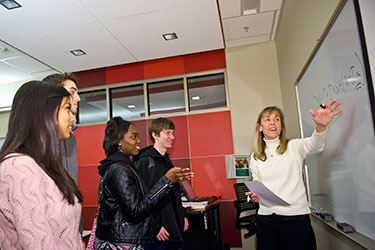Industrial Engineering BS
Scott E. Grasman, Department Head and Professor
(585) 475-2598, segeie@rit.edu
http://www.rit.edu/kgcoe/ise/
Program overview
Industrial engineers design, optimize, and manage the process by which products are made and distributed across the world (i.e., global supply chain), or the way services are delivered in industries such as banking, health care, energy, or entertainment. Industrial engineers ensure that high-quality products and services are delivered in a cost-effective manner.
Industrial engineering is ideal for those who enjoy both technology and working with people. Industrial engineers frequently spend as much time interacting with other engineers and product users as they do at their desks and computers. Typical work involves developing applied models and simulations of processes to evaluate overall system efficiency.
A degree in industrial engineering offers students a significant opportunity for a flexible long-term career. Employers have consistently praised the quality of RIT's industrial engineering graduates, noting that the range of their abilities includes both strong technical knowledge and COMMUNICATION skills. Graduates have used their technical base as a springboard to careers in management, consulting, manufacturing, sales, health care, law, and education.
 Because of the flexible nature of the major, the industrial engineering student can gain breadth of knowledge in many different areas of industrial engineering, including, but not limited to, advanced manufacturing, distribution/logistics, ergonomics/human factors, modeling/simulation, and sustainable design and development. Students may choose free and professional electives for this purpose. Faculty are committed to high-quality engineering education as well as the program's educational objectives.
Because of the flexible nature of the major, the industrial engineering student can gain breadth of knowledge in many different areas of industrial engineering, including, but not limited to, advanced manufacturing, distribution/logistics, ergonomics/human factors, modeling/simulation, and sustainable design and development. Students may choose free and professional electives for this purpose. Faculty are committed to high-quality engineering education as well as the program's educational objectives.
The industrial engineering curriculum covers the principal concepts of engineering economics and PROJECT MANAGEMENT, facilities planning, human performance, mathematical and simulation modeling, production control, applied statistics and quality, and contemporary manufacturing production processes that are applied to solve the challenges presented by the global environment and economy of today. The curriculum stresses the application of contemporary tools and techniques in solving engineering problems.
As described by the Institute of Industrial Engineers on the organization's website:
"Industrial engineering is about choices. Other engineering disciplines apply skills to very specific areas. IE gives practitioners the opportunity to work in a variety of businesses.
Many practitioners say that an industrial engineering education offers the best of both worlds: an education in both engineering and business.
The most distinctive aspect of industrial engineering is the flexibility it offers. Whether it's shortening a roller coaster line, streamlining an operating room, distributing products worldwide, or manufacturing superior automobiles, these challenges share the common goal of saving companies money and increasing efficiencies.
As companies adopt management philosophies of continuous productivity and quality improvement to survive in the increasingly competitive world MARKET, the need for industrial engineers is growing. Why? Industrial engineers are the only engineering professionals trained specifically to be productivity and quality improvement specialists.
Industrial engineers figure out how to do things better. They engineer processes and systems that improve quality and productivity. They work to eliminate waste of time, money, materials, energy and other commodities. This is why many industrial engineers end up being promoted into management positions.
Many people are misled by the term industrial engineer. It's not just about manufacturing. It also encompasses service industries, with many IEs employed in entertainment industries, shipping and logistics businesses, and health care organizations."
Industrial engineers are "big-picture" thinkers, much like systems integrators. IEs spend most of their time out in the work environment, using scientific approaches to solve today's problems while they develop solutions for the future.
Educational objectives
Faculty from the department of industrial and systems engineering, in conjunction with its constituents, have established the following educational objectives for the industrial engineering major:









